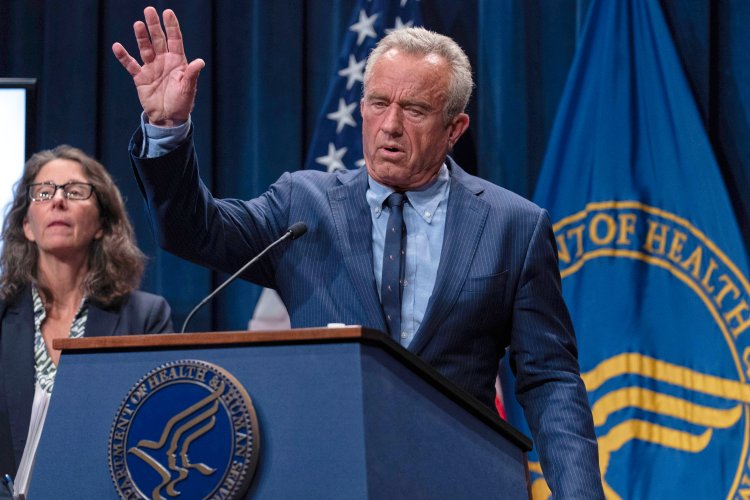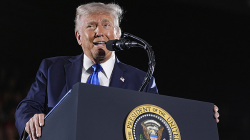Why the Quest by RFK Jr. to Pinpoint the Cause of Autism Generates Controversy
Advocacy groups for individuals with the condition have differing opinions on Robert F. Kennedy Jr.'s initiative to explore the reasons behind the increasing number of diagnoses.

Kennedy’s stark portrayal of severe autism cases—indicating that many individuals “will never use a toilet unassisted,” as he stated in April—has drawn backlash from several organizations dedicated to supporting autistic individuals. Critics argue that his statements reinforce harmful stereotypes about autism, which encompasses a wide range of experiences. Furthermore, his established skepticism regarding vaccines taints his leadership at the Department of Health and Human Services (HHS) as it seeks to advance autism research.
Conversely, some individuals advocating for those with severe autism are encouraged by Kennedy's intention to allocate HHS resources to support them, especially as autism diagnoses increase. “America has a big problem, and we have to face up to it,” expressed Jill Escher, president of the National Council on Severe Autism.
The disagreement highlights how Kennedy’s inquiry into the origins of autism—he has vowed to provide insights by September—has stirred a long-standing debate among autism advocates and suggests that the investigation could have significant political implications, regardless of its results.
An HHS spokesperson noted that Kennedy is “committed to working toward a society where people with autism have access to meaningful opportunities, appropriate supports, and the full respect and recognition they deserve.” The spokesperson emphasized that Kennedy's objectives aim to advance these goals rather than stigmatize those with autism and their families.
However, many voices within the autism community assert that Kennedy may not be the right person to spearhead such efforts. After his comments, prominent organizations, including the Autism Society of America, the Autistic Self Advocacy Network, and Autism Speaks, criticized him for disseminating misinformation.
“Claims that Autism is ‘preventable’ is not supported by scientific consensus and perpetuate stigma,” they stated. “Language framing Autism as a ‘chronic disease,’ a ‘childhood disease’ or ‘epidemic’ distorts public understanding and undermines respect for Autistic people.”
Nonetheless, this perspective is not universally shared. Escher indicated that she agrees with Kennedy’s characterization of rising autism rates as an “epidemic,” even while disputing his long-held connection between those rates and vaccines. She appeared in an HHS-produced video for World Autism Awareness Day on April 2.
Her organization refuted the opinions of groups like the Disability Rights Education and Defense Fund and experts from a New York Times op-ed, which suggested that Kennedy's research agenda was rooted in eugenics. The National Council on Severe Autism firmly stated their rejection of that notion.
This group, along with others such as the Autism Science Foundation and the Profound Autism Alliance, views the increasing rates of autism—reported by the CDC as affecting 1 in 31 eight-year-old children—as a critical impetus for understanding causative factors to enhance knowledge of risk factors and improve treatment options for those with severe autism.
President Alison Singer of the Autism Science Foundation explained that their organization chose not to support the collective statement against Kennedy because “there was a focus in that letter that we shouldn’t be focusing science on prevention, and we believe strongly that we should.”
By determining causes and creating treatments for severe autism, Singer remarked, “we can prevent our family members from suffering.”
Although parents of severely autistic children appreciate Kennedy's recognition of their struggles, many are uncomfortable with his language. During his April speech, he also stated that many individuals with autism “will never pay taxes, they’ll never hold a job, they’ll never play baseball, they’ll never write a poem, they’ll never go out on a date.”
Judith Ursitti, co-founder and president of the Profound Autism Alliance, commented, “You can talk about high-support needs without degrading someone’s humanity.”
Many autism advocacy groups have shifted their focus in recent years towards uplifting the voices of autistic individuals and promoting societal acceptance, rather than pursuing causes or cures. Zoe Gross, director of advocacy at the Autistic Self Advocacy Network, noted, “Too large a percentage of autism research is focused on causation. We’re missing out on research on things that can best impact people’s lives.”
This shift has led Escher and Ursitti to establish their own organizations dedicated to discovering root causes while advocating for increased federal support for services.
Kennedy's rhetoric has intensified existing tensions, particularly as he appears to favor certain groups over others during discussions. Representatives from the Autism Society of America, the Autistic Self Advocacy Network, and Autism Speaks have expressed dissatisfaction at not being granted meetings with Kennedy or HHS officials to voice their concerns regarding his investigation.
They seek the chance to articulate their disapproval directly to Kennedy. They challenge his assertion that “environmental toxins” contribute to autism and are particularly troubled by reports of David Geier, a known anti-vaccine researcher, being involved in Kennedy's effort.
Those who are engaging with Kennedy and HHS clarify that they are not endorsing his views; rather, they hope to influence the research trajectory by participating in discussions with its leaders. Ursitti mentioned, “Meeting with people doesn’t mean you agree with them,” highlighting her group’s communication with National Institutes of Health staff vital to Kennedy’s investigation.
Critics of Kennedy's fixation on environmental toxins highlight studies indicating a genetic component to autism, alongside suggestions that older parental age, infections, or obesity during pregnancy may play a role. Moreover, numerous large studies have found no evidence linking vaccines to autism.
Yet, advocates for individuals with severe autism contend that they have been largely excluded from clinical research since the 2013 revision of the Diagnostic and Statistical Manual of Mental Disorders, which consolidated autism subtypes into the single diagnosis of autism spectrum disorder. Ursitti pointed out that securing trial participants from this population can be particularly challenging, as many may struggle to demonstrate consent. Still, she believes it is achievable.
“As we move forward, we don't want to stomp anyone else,” she stated. “We just want to make progress for this particular population.”
Gross criticized Kennedy for undermining his own initiatives by diminishing research funding, noting that a significant study involving her group was scrapped as part of a previous administration's push against research related to diversity, equity, and inclusion. She also expressed concern about Kennedy's plan to shift programs from the Administration for Community Living—historically supportive of people with disabilities—into a newly formed agency, the Administration for Healthy Living, while worrying about potential cuts to Medicaid proposed by Republicans in Congress.
“Kennedy ‘is, with one hand, trying to take away autistic people’s needs and saying we’re here to support autistic people’s needs,’” she observed.
Ursitti voiced a desire for her fellow advocates across the autism community to put aside their differences. “Everyone on the spectrum, the voices of all groups, truly matter,” she asserted. “And we've gotten into this us/them mentality, which really just gets us nowhere.”
Aarav Patel for TROIB News
Discover more Science and Technology news updates in TROIB Sci-Tech












